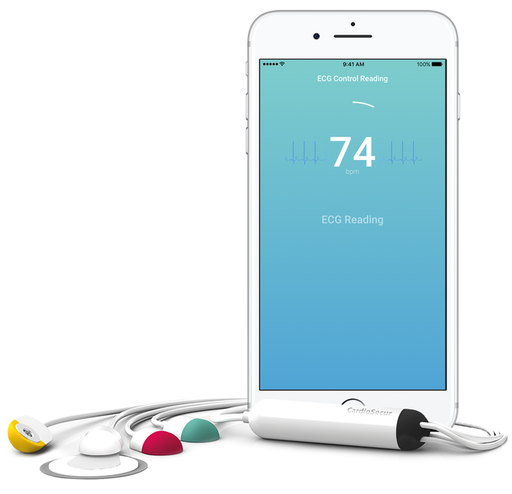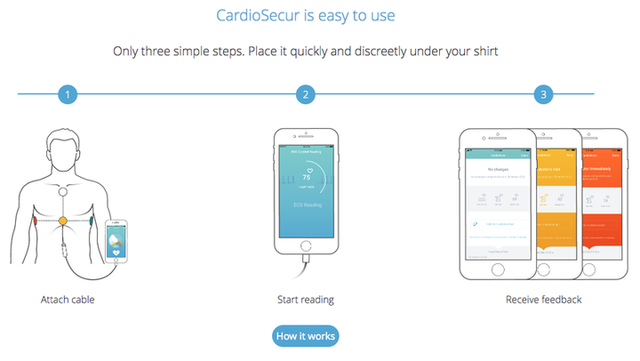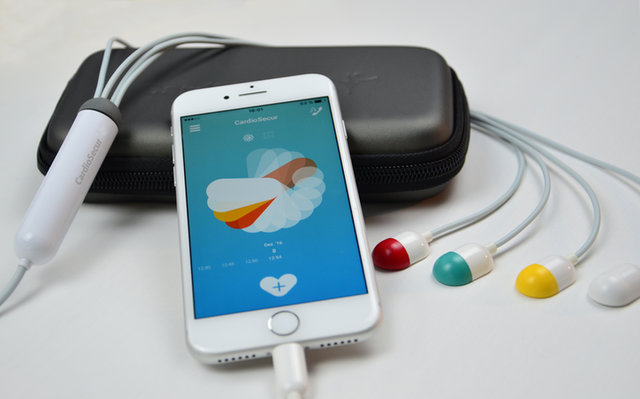CardioSecur, a product by German-based company; Personal MedSystems, is on the forefront of revolutionizing cardiac care. The 22-lead 3D ECG device outshines the established, “gold standard” of the conventional 12-lead ECG you would find in hospitals.
By Elena Borrelli

Dr. Markus Riemenschneider played competitive football in his younger days and suffered from a supraventricular tachycardia (rapid heartbeats), which repeatedly happened during training. In addition, his family had a positive family history of cardiac disease. “As an athlete, I always asked myself whether my rapid heartbeats were really harmless whenever they occurred – as my cardiologist regularly assured me,” Riemenschneider reminiscences, “I also wondered, if the chest pain my father suffered from before his heart attack, could have been interpreted in a better way.”
After completing his doctorate at Technical University of Munich; Riemenschneider became interested in the technical aspects of ECG measurements. It was then he learned that an ECG is a valid indication about the current state of a patient’s health at the time of symptom occurrence. For example, the unpleasant but generally harmless supraventricular tachycardia can be clearly distinguished from the acutely life-threatening venereal tachycardia. And that an unstable stenosis in the coronary arteries can be detected in the ECG when a painful sensation occurs – a so-called ST segment depression. “This gave birth to the idea of creating an ECG device that give people a trigger to act in unclear situations,” Riemenschneider recalls.
There are 200 million people worldwide with cardiac symptoms. The severity and frequency of these symptoms are not always indicative of the potential associated risk. Swift action is needed if critical cardiac events occur (Golden Hour). Individuals are often on their own to decide what may be a serious event and what to do about it. Capturing a symptom event when it occurs and providing individuals with a profound medical trigger to act when a serious event strikes lies at the heart of CardioSecur. The founders created the company in 2008 to bring their idea of a small, smartphone-based, but uniquely profound ECG device with a trigger to act to life. “Today CardioSecur’s solutions helps people exactly in situations that my father, my relatives and myself experienced,” notes Riemenschneider.
Markus Riemenschneider and Felix Brand founded CardioSecur in 2008 with a vision to provide individuals with a means of early detection of cardiac abnormalities. Over the years they and their team have brought their vision to fruition. After 3 years of development, CardioSecur; a mobile 22-lead ECG became available to patients in 2011. With CardioSecur, a patient’s cardiac function is captured at the time in which a symptom occurs and provides the individual with an intelligent medical trigger with instructions to act when a serious cardiac event has occurred. “There is really no other mobile, App-based 22-lead technology available on the market today. With its 22-lead 3D ECG CardioSecur even outshines the established ‘gold standard’ of the conventional 12-lead ECG you would find in hospitals,” he reckons.

…Swift action is needed if critical cardiac events occur (Golden Hour). Individuals are often on their own to decide what may be a serious event and what to do about it.
Dr. Markus Riemenschneider,Founder and Managing Director of CardioSecur
CardioSecur is the only technology that implements the guidelines of the European Society of Cardiology (ESC) in recording the posterior and right side of the heart in one synchronous reading. In this way CardioSecur is not only able to help to detect complex arrhythmias but life-threatening heart attacks as well.
CardioSecur provides easily accessible mobile cardiac monitoring to patients. The app is downloaded to an iPhone or iPad. A patient easily connects the four electrodes to their body and CardioSecur uses a vector electrocardiography to create a 360-degree view of the heart— allowing for a diagnosis of anterior, lateral and posterior wall infarctions. Initially, a baseline ECG is captured and further ECGs are compared to the patient’s baseline ECG. This unparalleled comparison allows for truly personalized and accurate detection of any ECG changes and gives the user an immediate trigger to act if medical help is required. A reading can be taken anytime and anywhere, takes only a few seconds and feedback is always given in disregard of internet availability.
If a severe arrhythmia or other life-threatening abnormality is detected, the patient is instructed to contact their medical provider immediately. A patient’s ECG data can be transmitted directly to their healthcare provider. The provider receives extensive data which includes 12-lead ECG plus V7-V9. CardioSecur can be used anywhere, helping preserve a patient’s quality of life and decreasing physician office visits and hospitalizations.


“There is really no other mobile, App-based 22-lead technology available on the market today. With its 22-lead 3D ECG CardioSecur even outshines the established, “gold standard” of the conventional 12-lead ECG you would find in hospitals.”
CardioSecur has brought clinical grade ECG technology to places where previously not available. In 2019, Lufthansa Airlines has equipped all long-haul airplanes with CardioSecur. Flight attendants without cardiological expertise can record an ECG for passengers and send the test results directly to a medical hotline on the ground. This provides a better basis for deciding whether it is necessary to divert a plane in order to provide medical care on the ground and increases passenger safety. Other areas where CardioSecur is currently used include telemedical aftercare and monitoring. In Italy, MedEA services approximately 100 pharmacies across Italy and CardioSecur allows patients to take their ECG directly at the pharmacy and receive feedback without the need to schedule a doctor’s visit.
CardioSecur qualityis next to none. A recent comparative study compared CardioSecur to the standard 12-lead bedside ECG. Results of the study demonstrated that all 41 participants measured identical clinical diagnosis by both CardioSecur and Philips M2601B standard 12-lead bedside ECG. Many other studies confirm the effectiveness of CardioSecur. There are several mobile ECG monitors available to consumers, but quality of technology varies. The market currently offers mobile monitors with three main types of technologies. These include; 1-lead or 6-lead gadget ECGs, 12-lead ECG and finally, CardioSecur with up to 22-lead and 360-degree diagnostic view of the heart. CardioSecur’s advanced technology shows changes in the heart’s activity which help to diagnose arrhythmias or myocardial infarcts in any area of the heart. It is not just a screening tool; it is a diagnostic tool.
Patients in various settings benefit from CardioSecur. Apart from cardiologist use, CardioSecur also provides a large benefit when used in primary care offices, house visits, emergency settings and to patients living in rural areas. A patient’s ECG is automatically saved under the patient’s name in the app and can be saved in various formats. Integration with the Hospital Information System can help physicians and EMS determine whether or not the patient requires hospitalization at a location where a cardiac catheterization lab is available. This can help reduce door-to-balloon time.
CardioSecur increases healthcare providers work-day productivity by avoiding unnecessary office visits and allowing for increased schedule availability for patients who do require office visits. Direct ECG transmission also provides healthcare providers with the necessary information to prepare for visits prior to a patient’s appointment arrival time. This also opens up time during office appointments for patients to ask questions. Less wait time and increased schedule availability are key contributors to increased patient satisfaction. CardioSecur increased the realm of reachable patient populating by providing mobile cardiac monitoring and early detection of cardiac diseases to patients who secondary to health reasons or lifestyle barriers, do not have easy accessibility to a physician office or hospital.
From playing football in his younger days, Riemenschneider these days actively participates in running, climbing, bouldering/rock climbing and skiing. He is also hooked on to marathons. His special love for ‘sports’, the main driving force behind the development of CardioSecur, makes Riemenschneider envision a future that lies in monitoring people during exercising and sports and give them a warning at the exact moment their health status changes. “That is of interest not only for high risk patients but also to middle-aged athletes like myself,” he says. The dangers of suffering from cardiovascular diseases only increase steadily with age and especially among marathon runners there are often cases of tragic deaths.
“With the CardioSecur of the future I will be able to receive a warning during the run if certain parameters of the ECG change before it leads to a life-threatening situation,” he smiles.
CardioSecur expands attainable patient populating by providing mobile cardiac monitoring and early detection of cardiac diseases to patients who due to health reasons or lifestyle barriers, do not have easy access to a physician office or hospital.

New Horizons...
Top-notch Quality
Versatile Patient Settings
How CardioSecur Works
Powering Productivity
More to Come…
